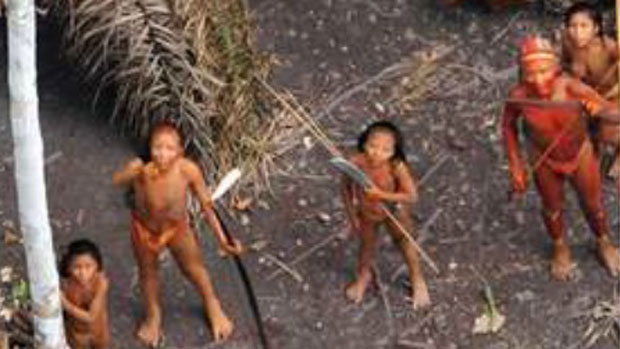'Lost' Amazon tribe forced out of the rainforest
Illegal logging in the Amazon is blamed, as NGO warns the tribe could now face extinction

A free daily email with the biggest news stories of the day – and the best features from TheWeek.com
You are now subscribed
Your newsletter sign-up was successful
A group of Amazon Indians, who had previously had no contact with the outside world, has been forced out of the Brazilian rainforest due to illegal logging and drug trafficking.
For the first time in history, members of the tribe have left the rainforest and initiated contact with a local community, according to indigenous-rights group Survival International.
Federal policy forbids direct contact with tribes such as this, for fear of introducing new diseases or harming their local culture and environment.
The Week
Escape your echo chamber. Get the facts behind the news, plus analysis from multiple perspectives.

Sign up for The Week's Free Newsletters
From our morning news briefing to a weekly Good News Newsletter, get the best of The Week delivered directly to your inbox.
From our morning news briefing to a weekly Good News Newsletter, get the best of The Week delivered directly to your inbox.
They may now be faced with viruses against which they have no immunity, such as chicken pox, measles or the common cold, which could prove deadly.
"The uncontacted Indians now face the same genocidal risk from disease and violence which has characterised the invasion and occupation of the Americas over the last five centuries," warned Survivor's Director Stephen Corry.
The Western part of the Amazon covers several states in Brazil and parts of Peru and is home to some of the world's last uncontacted Indians.
Land along Brazil's border with Peru is highly sought after, and fought over, due to the presence of timber, oil, minerals, natural gas, and hydroelectric and farming potential, National Geographic reports.
A free daily email with the biggest news stories of the day – and the best features from TheWeek.com
Brazil's Indian Affairs Department and Survival previously warned Peruvian authorities of the dangers the extensive logging could cause to local tribes.
"It shows the injustice we face today," said Nixiwaka Yawanawá, an Indian from the same state as the tribe, who works for Survival international. "They are even more vulnerable because they can’t communicate with the authorities. Both governments must act now to stop a disaster against my people."
-
 How the FCC’s ‘equal time’ rule works
How the FCC’s ‘equal time’ rule worksIn the Spotlight The law is at the heart of the Colbert-CBS conflict
-
 What is the endgame in the DHS shutdown?
What is the endgame in the DHS shutdown?Today’s Big Question Democrats want to rein in ICE’s immigration crackdown
-
 ‘Poor time management isn’t just an inconvenience’
‘Poor time management isn’t just an inconvenience’Instant Opinion Opinion, comment and editorials of the day
-
 Epstein files topple law CEO, roil UK government
Epstein files topple law CEO, roil UK governmentSpeed Read Peter Mandelson, Britain’s former ambassador to the US, is caught up in the scandal
-
 Iran and US prepare to meet after skirmishes
Iran and US prepare to meet after skirmishesSpeed Read The incident comes amid heightened tensions in the Middle East
-
 Israel retrieves final hostage’s body from Gaza
Israel retrieves final hostage’s body from GazaSpeed Read The 24-year-old police officer was killed during the initial Hamas attack
-
 China’s Xi targets top general in growing purge
China’s Xi targets top general in growing purgeSpeed Read Zhang Youxia is being investigated over ‘grave violations’ of the law
-
 Panama and Canada are negotiating over a crucial copper mine
Panama and Canada are negotiating over a crucial copper mineIn the Spotlight Panama is set to make a final decision on the mine this summer
-
 Why Greenland’s natural resources are nearly impossible to mine
Why Greenland’s natural resources are nearly impossible to mineThe Explainer The country’s natural landscape makes the task extremely difficult
-
 Iran cuts internet as protests escalate
Iran cuts internet as protests escalateSpeed Reada Government buildings across the country have been set on fire
-
 US nabs ‘shadow’ tanker claimed by Russia
US nabs ‘shadow’ tanker claimed by RussiaSpeed Read The ship was one of two vessels seized by the US military